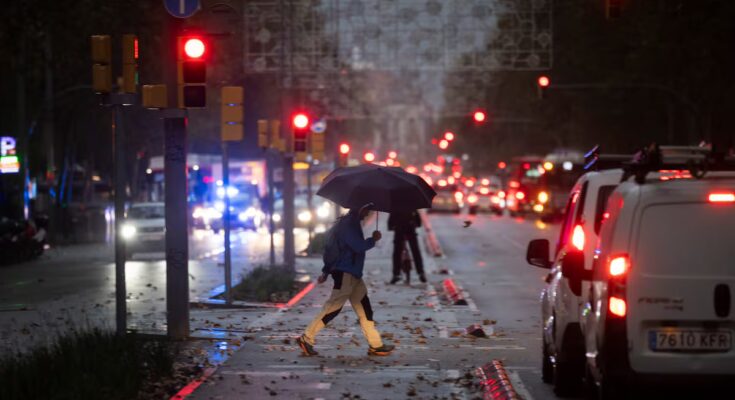The intense rain front that hit Catalonia this Thursday caused mobility problems during the morning, both on road and rail, the suspension of flights and also forced the cancellation, as a precaution, of lessons in most universities. The intense rains, especially in Terres de l’Ebre, Vallès and in the north of Girona, also caused minor flooding in the streets, shops and basements of some municipalities, but no injuries were reported.
According to data from the Meteorological Service of Catalonia, the highest records until midday occurred in Caldes de Montbui, with 81.7 liters per square meter, Benissanet (61.4) or Masroig (48.6). Even in the municipalities of Girona, such as Roses or Sant Pere Pescador, 40 liters have been exceeded, as in others in the Vallès, such as Sabadell. In the co-capital Valles, the rains flooded some bridges on the Gran Via and Rambla Ibèria. Protecció Civil deactivated the Inuncat plan alert at 1.45pm, but keeps it on pre-alert in the northwest.
In Girona, the firefighters received around sixty reports, especially in the regions of Gironès and La Selva. Although most of the interventions were due to flooded basements, interventions also had to be carried out due to a light pole in Sant Miquel de Campmajor or a tree in the middle of the road between Maçanet de la Selva and Sant Hilari Sacalm, reports Marta Rodriguez.
Heavy rains that fell in a short time, such as 35 l/m2 in 20 minutes in Sant Hilari, caused specific flooding in four low-lying spots in the municipality where water entered shops and cars. In L’Escala there was also damage to some shops due to the water that accumulated in the streets. The heavy rain that fell at midday also flooded the streets of towns in the north of the Costa Brava, such as Port de la Selva.
The morning rains also caused traffic jams on the AP-7 motorway, near Vallès, while the C-17 in Mollet del Vallès and the BP-1413 in Cerdanyola del Vallès were interrupted due to flooding. Retentions were also recorded in the two rounds in Barcelona.
In rail transport, the circulation of the R4 Rodalies between Sabadell and Terrassa (Barcelona) was interrupted due to adverse weather conditions. Likewise, the fall of a wall caused the interruption of the R15 between Mora and Ascó, and damage is also recorded on the R14 between Lleida and La Plana de Picamoixons due to a fault which interrupts traffic at Riu Milans. The rest of the suburban lines also suffered slowdowns during the storm and the R2 has been interrupted, since 8:00, between Castelldefels and Granollers Center due to an accident at Gavà station. At 9.20am the R2 train service was restored.
Likewise, at El Prat airport, 47 flights were cancelled, two had to be diverted to other destinations and a hundred operations were delayed, according to Aena.
To minimize travel, all universities, except URV and UdL, have announced the suspension of classes for the entire day. At first, Pompeu Fabra had assured that the activity would be interrupted until 1pm, but then announced that it would last the whole day. As for private campuses, they maintain classes, but are flexible regarding assessable activities.
The Generalitat of Catalonia sent an alert to all mobile phones on the coast and pre-coastal yesterday Wednesday at ten pm for the arrival of intense rain, which could become torrential. The technical committee of Pla Inuncat analyzed the evolution of the rainfall, led yesterday evening by the President of the Generalitat, Savador Illa, accompanied by the Minister of the Interior, Núria Parlon. The director of the Meteorological Service of Catalonia, Sarai Sarroca, assured that the rain “will be intense, but will not last long”, with an intensity of 4 out of 6, with around 40 liters per square meter in half an hour.
Parlon stressed that rain should not be static, but moving, which in principle will make it more unlikely that large concentrations of water will occur and cause flooding. The city of Barcelona has activated the municipal emergency plan due to poor drainage in the alert phase due to heavy rain. The first snowfalls are also expected in the Pyrenees, although they will not be intense.
Parlon underlined that the Operational Coordination Center of Catalonia (Cecat) will be strengthened during the night and early morning. Parlon asked citizens to “be cautious” and above all to avoid unnecessary travel and movement of the vehicle if it is near waterways or flood zones.



